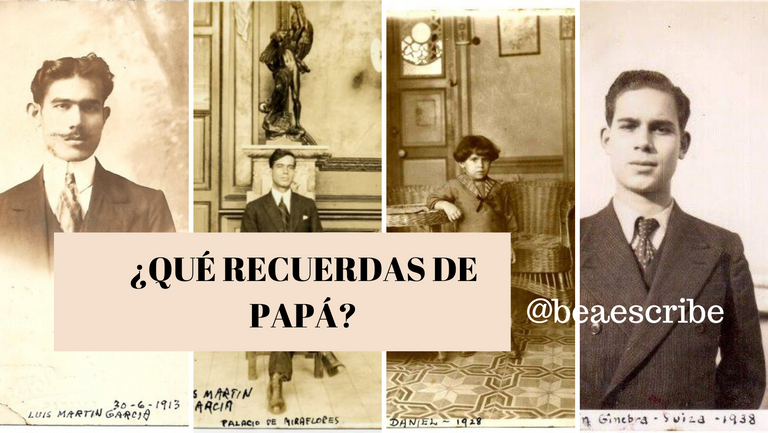
Iniciativa ¿QUÉ RECUERDAS DE PAPÁ?/ Un hombre honorable
Dad was an honorable man, that is to say, he always acted with honesty, in a correct way, for him it was fundamental to be guided by the parameters that his religion, the Catholic religion, had taught him, respecting the ten commandments that Moses gave to human beings. And so he educated his four daughters. He studied elementary school at the Deutsche Schule, the German School of Caracas, and had a mother with a strong character, not very affectionate, grandmother Adelina.
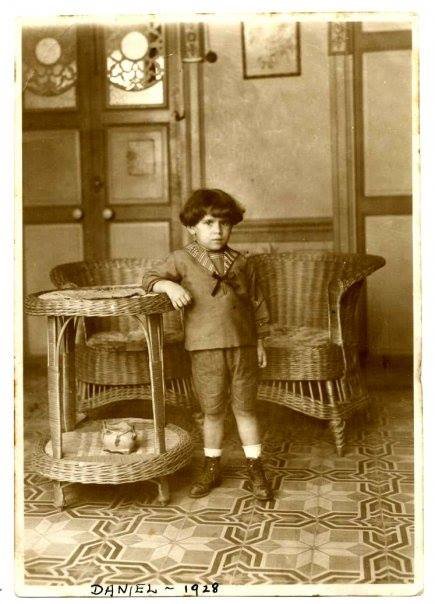
papá 1928
That made him a very disciplined and organized person. He could be excessively severe in his ideas, in the way he acted, in the way he imposed discipline. He even went so far as to do it through violence with my older sisters, who were rebellious. But he could also be affectionate and sentimental, but he had a hard time handling his emotions or expressing them. Our culture, unfortunately, prohibits men from expressing their feelings, and if we add to that a rigid education at home and at school... I think that hurt Dad a lot.<br>
Since I was a little girl I had a very special connection with Dad, which my sisters did not have. Maybe because I was a quiet, self-absorbed, sentimental child, and I awoke in him the desire to protect me, but I was also very affectionate with him, at some point he nicknamed me "melaíto". I felt adoration for that father, who even though he was severe, lived completely devoted to his family.
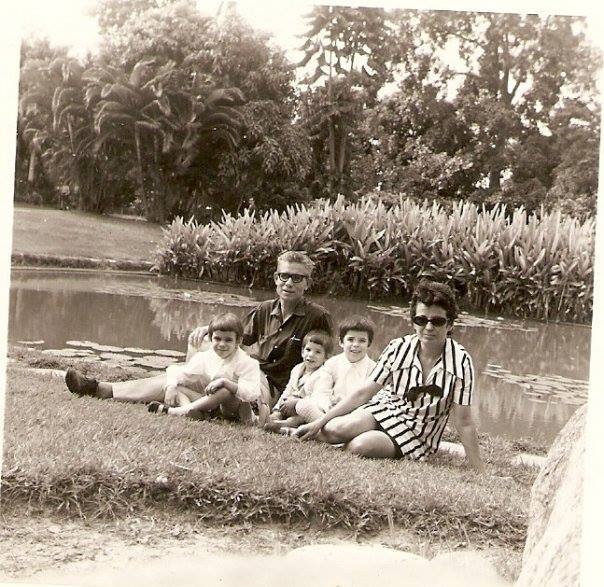
Parque del Este
He worked in a financial institution and at the end of his working hours he would go straight home. Every weekend he would go to the market on Saturdays and on Sundays he would always take us out for a walk, after Sunday mass, we would go to parks, to the beach, to some place where we could be at ease. Sometimes we would go to visit some of our uncles or aunts who lived at Caracas, and on vacations we would visit relatives who lived in the provinces. Dad had a black Volkswagen in which he rode with his wife and four little girls. Only when he was sick, he was asthmatic, the volswagen would stay in the car without leaving the parking lot, or when we had a birthday celebration at home.
Los ancestros
Ancestors
When I became an adult there was something that also brought us very close together. I always had an interest in the ancestors. I didn't know my grandparents, because when I was born they had already died. Dad from a very young age was fond of photography and had a collection of photo albums he had taken over the years. In some of them there were also photos of his parents, of his uncles and aunts. I would ask him questions and we would talk: -Dad,what was Grandpa like? -Dad, what was Grandma like? where were they from? where did they live when this picture was taken? We even got to talking about a difficult subject, his parents' divorce.
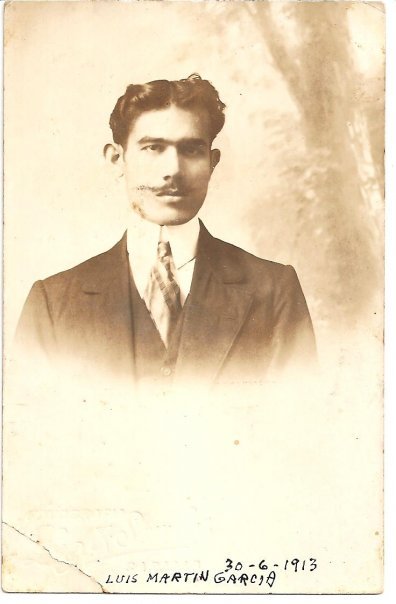
Mi abuelo paterno Luis Martín García Arragas
El divorcio de los abuelos
Grandparents' divorce
Her parents divorced, due to irreconcilable differences, in the early 1940s. They had married in 1919. In those days people married forever, and even if they didn't get along, they didn't divorce. His parents' divorce hit dad hard, when his parents separated he was twenty years old and started working to help grandma and his younger siblings. Grandma played piano and taught piano lessons.
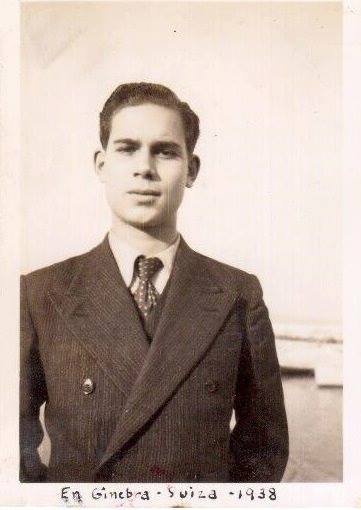
When his grandfather Luis Martin, his father's father, was the Venezuelan consul in Geneva, he had to undergo surgery for throat cancer during the Second World War, between 1938 and 1941. It was then when he fell in love with one of the nurses who took care of him, Magdalena Tissot, which precipitated the end of his relationship with his grandmother, who was already in bad shape. The grandmother managed to get the grandfather to return to Venezuela, in the middle of the war, but separation was inevitable. At the end of the war, grandfather had fallen in love with Isabel, with whom he had two unmarried children, Uncle Luis and Aunt Luz Marina. But when Magdalena Tissot arrived in Venezuela and sought out grandfather Luis, he kept his promise of marriage and married her, abandoning Isabel and their two small children. This series of events affected Dad very much. We would talk about these and other stories when we looked at the albums. Many times we unknowingly carry over actions and attitudes of our ancestors that affected our parents.
Su amor por la música y el dibujo
His love for music and drawing
Something that Dad liked very much was music, let's remember that his mother was a musician. When he was idle at home, he liked to play the guitar and would sing some Venezuelan songs like "Ansiedad", "Rosario", "Sombra en los médanos", or he sang old French songs, which he learned during a time he lived in France, invited by his military brother, Martin, who did his General Staff there. Dad was also skilled in drawing and studied for a while at the Académie Julian in Paris, but he was not an artist, he did not dedicate himself professionally to that. There he met the plastic artist Jesús Soto, who also played the guitar, and the painter Oswaldo Vigas.
Su generosidad
His generosity
Another important quality of Dad was his generous and compassionate spirit. He helped most people who had a need and asked him for something. For many years he sent money to Catholic missions in India. At one point he wanted to become a priest and entered a Seminary, but eventually dropped out, he told me for health reasons. He was deeply Catholic.
Su muerte
SILENCIOS EN EL AIRE
Mi padre se ha ido.
Su ausencia dibuja
silencios en el aire.
Nos torna frágiles,
él, que siempre impuso
su presencia, su fortaleza,
hasta que se quebró
como algunos árboles
y no volvió a levantarse.
Lo he dejado irse,
serenamente,
la única de sus hijas
que pudo acompañarlo
en su muerte de hospital;
lo he dejado quedarse,
en ese rincón que habitará
siempre, en mi sangre,
en mis gestos, en mi corazón.
Mi padre se ha ido.
Su ausencia dibuja
silencios en el aire.
marzo 13, 2018
Beatriz Alicia García N.
His death
I was with him when Dad died in a hospital in Caracas, after fracturing his hip, five years ago, he was 96 years old. He had been in bed for a month, with severe pain and other ailments. He had a long life. Shortly after, I wrote this poem that belongs to my book of poems "Rituales de la casa", which will be published by the Venezuelan publishing house La Diosa Blanca. Something was broken with her death, but at the same time she has not ceased to be present at home in some way:
SILENCES IN THE AIR
My father is gone.
His absence draws
silences in the air.
It makes us fragile,
he, who always imposed
his presence, his strength,
until he broke
like some trees
and never rose again.
I let him go,
serenely,
the only one of his daughters
who was able to accompany him
in his hospital death;
I let him stay,
in that corner that will always
in my blood, in my gestures, in my heart,
in my gestures, in my heart.
My father is gone.
His absence draws
silences in the air.
March 13, 2018
Beatriz Alicia García N.

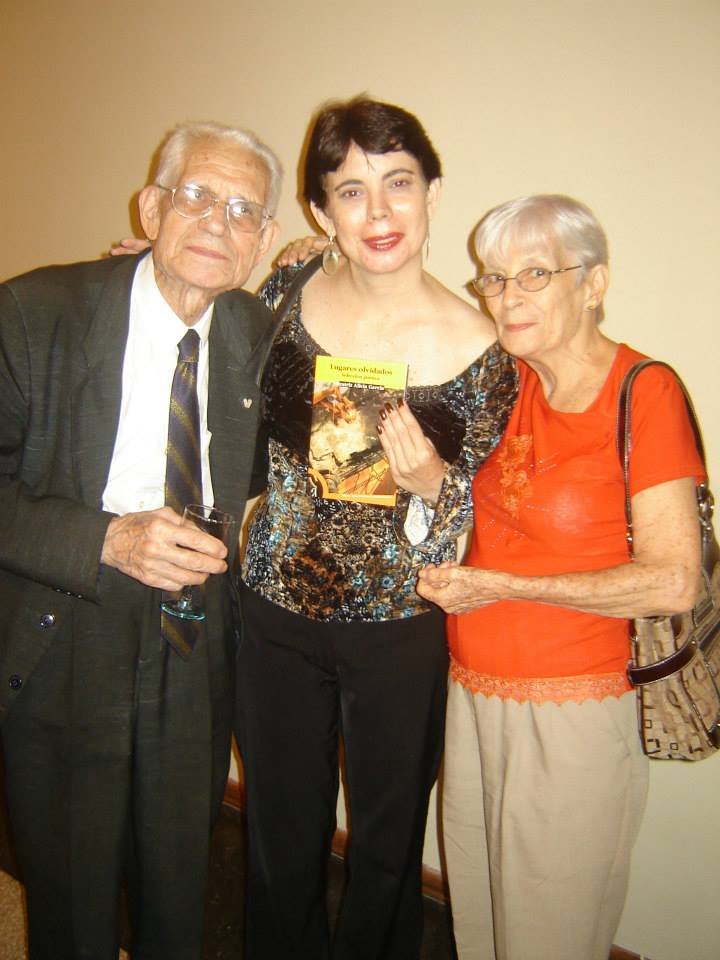
Con papá y mamá en la presentación de mi libro "Lugares olvidados", Galería de Arte Nacional, 2007.
With mom and dad at the presentation of my book "Lugares olvidados" (Forgotten Places), National Art Gallery, 2007.
I inherited from my father some of his good and not so good qualities. I am organized like him, but I can also be sometimes too rigid, especially if a person or situation doesn't seem right to me. Also like him I am a generous person and I am happy when I can help and make other people happy. I also love music even though I don't play any instruments. And I will always thank him for the good values he taught me and my sisters, the importance of being honest people, of acting correctly.
For me it has always been important to inquire about my paternal and maternal ancestors. Thank you @ for your initiatives about ancestors. Dear reader, what do you know about yours?
I invite @josemalaveg and @crisch to participate in this nice initiative What do you remember about your father?
Todas las fotografías pertenecen a mi álbum familiar.
All photographs are from my family album.
Translated with www.DeepL.com/Translator (free version)
